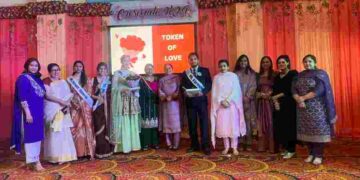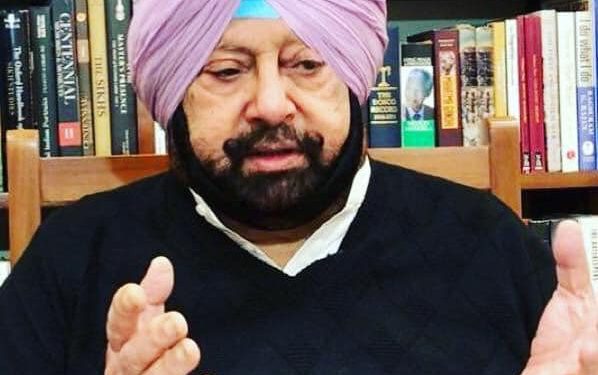ALL RURAL HOUSEHOLDS IN THE STATE TO HAVE POTABLE PIPED WATER CONNECTIONS BY MARCH 2022: CAPT AMARINDER SINGH
Chandigarh, December 21:
“All persons living in 1634 water quality affected villages in the State will be provided clean drinking water within the next one year”, said the Punjab Chief Minister Captain Amarinder Singh.
While presiding over a meeting of the State Water and Sanitation Mission over the weekend, Captain Amarinder Singh said that the State Government is committed to ensuring supply of potable water to all such villages in Punjab which are affected by fluoride, arsenic and other heavy metals through both short-term and long-term mitigation measures, said the Chief Minister. Clean drinking water is a basic right of all individuals, be it rich or poor, and it is the duty of the State Government to ensure its supply, he stated.
Giving further details, a spokesperson of the State Government stated that Punjab was spending Rs.1191 crore on undertaking such measures. All short-term measures at both individual household level or community level would be completed in 2021, preferably by June. The long-term measures, which included new schemes based on either surface water or Arsenic and Iron Removal Plants, would be accomplished over the next 2-3 years.
In addition, the State would cover all 35 lakh rural households with potable piped water connections by March 2022 under the Jal Jeevan Mission. Already 22.63 lakh rural households stand covered under the scheme. 3 districts, namely SAS Nagar (Mohali), Rupnagar and Shaheed Bhagat Singh Nagar, have achieved the distinction of 100% coverage of all their villages, said the spokesperson.
The Department of Water Supply & Sanitation would also be undertaking development of multi-level state-of-the-art laboratories for testing of water quality across the State. A proper Management Information System was being created to ensure tracking of each sample being tested by laboratories at any level, he added.
Water Supply Minister Razia Sultana stated that the first 24×7 multi-village water supply scheme based on surface water would be commissioned in January 2021 in Moga. This scheme being undertaken on DBOT basis under the World Bank aided project costs Rs. 232 crore and would cover 85 villages, some of which have reported traces of uranium, and would provide round-the-clock running tap water to around 3 lakh persons of the area. In addition, many other surface-water based multi-village schemes were under progress in the districts of Patiala, Fatehgarh Sahib, Gurdaspur, Amritsar and Tarn Taran and would be completed by December 2022. She further stated that new water supply schemes were also being proposed in the water scarcity areas of Fazilka, Ferozepur, Hoshiarpur and Rupnagar districts. The Department stood fully committed to achieve the mission of Har Ghar Nal, Har Ghar Jal, said the Minister.
The Mission also gave its in-principle approval for setting up of a special purpose vehicle (SPV) under the Department for managing multi-village water supply schemes in partnership with the community through representatives of the Gram Panchayat Water & Sanitation Committees. The Mission also gave its consent for creating a ring-fenced account called Water Quality Kosh for ensuring proper maintenance of water quality mitigation measures and their monitoring and testing in the rural areas of the State.
The Mission also endorsed the suggestion of Health Minister Balbir Singh Sidhu that smaller water supply schemes where water table was relatively high should be taken up for solarization of pump sets on priority. This would help in saving of electricity and also help in reducing the expenditure of the Department on power supply.
The Department also informed that the State Government had agreed to its proposal for One-Time Settlement of dues of DWSS run schemes with PSPCL and Rs. 200 crore was written off with the approval of PSERC. The Department had also obtained order from PSERC to treat rural water supply as a special category under PSPCL with reduced tariff, thereby making the operations of water supply schemes more sustainable. Further, Rs. 250 crore has already been paid to PSPCL for settlement of outstanding dues, said the spokesperson.
On the Sanitation side, the State had already achieved 100% Open Defecation Free status in March 2018. Now Swachh Bharat Mission Gramin (Phase II) has been launched in the State which is focussing on sustenance of ODF status, solid waste management, liquid waste management, faecal sludge management and construction of community sanitation complexes, he stated.
Among the others who attended the meeting were Water Supply Minister Razia Sultana, Health & Family Welfare Minister Balbir Singh Sidhu, Chief Principal Secretary Suresh Kumar, Chief Secretary Vini Mahajan and Principal Secretary Water Supply & Sanitation Jaspreet Talwar.








